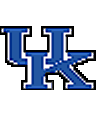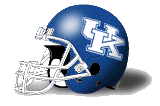BIG BLUE FANS FOR

 FOOTBALL
FOOTBALL
2016
GATEWAY TO THE 2016 SEC FOOTBALL SEASON
ARE UK FOOTBALL FORTUNES FOR 2016
REALLY ON DREW BARKER'S SHOULDERS?
Over the last several months, there has been considerable chatter among members of the Big Blue Nation that success in 2016 will greatly depend upon the success of Drew Barker now that he has been designated UK's starting quarterback. Those who advance these arguments contend that the quarterback is the most important player on the field because the quarterback's ability and contribution enhance the play of his teammates, thus magnifying the contribution of his individual mere numbers to team success in major college football.
However, the history of UK football quarterbacks over the last eight season do not support a relationship between the quality of quarterback play as measure by passing efficiency and success on the field as measured by total wins in the season. Why would it be any different in 2016 now that Drew Barker is the starting quarterback?
During the previous eight seasons, UK won between two and seven games for the season. The three 6 or 7 win seasons (2008, 2009, and 2010) had bowl games with a bowl win (2008) and two bowl losses (2009 and 2010). UK's Quarterback passing efficiency has ranged during the last eight seasons between 144.1 (31 st NCAA rank in 2010) to 96.2 (118 th NCAA rank in 2011). For the three consecutive bowl seasons, the quarterback passing efficiency was 102.4 (105 th NCAA Rank) which produced 7 wins including a bowl win in 2008, 108.6 (109 th NCAA Rank) which produced 7 wins including a bowl loss in 2009, and 144.1 (31 st NCAA Rank) which produced 6 wins including a bowl loss in 2010.
The five seasons since the last bowl appearance have quarterback passing efficiencies of 96.2 (118 th NCAA Rank and 5 wins), 108.6 (111 th NCAA Rank and 2 wins), 131.1 (68 th NCAA Rank and 2 wins), 122.5 (67 th NCAA Rank and 5 wins), and 112.0 (97 th NCAA Rank and 5 wins). While the best quarterback play occurred during one of the bowl seasons, and the poorest quarterback play occurred during a non-bowl season, there is no compelling correlation that could even suggest, much less support a positive correlation between the quarterback passing efficiency and total wins. If there is a discernable trend at all, it is very slightly negative against this thesis.
The table below supplies the data of record in the NCAA D1 statistical archives.
Year |
wins |
QB Eff |
QB Eff. ranking |
2008 |
7 |
102.4 |
105 |
2009 |
7 |
108.6 |
109 |
2010 |
6 |
144.1 |
31 |
2011 |
5 |
96.2 |
118 |
2012 |
2 |
108.6 |
111 |
2013 |
2 |
131.1 |
68 |
2014 |
5 |
122.5 |
67 |
2015 |
5 |
112 |
97 |
In my opinion, efficiency of play by the quarterback is important, but it is not the only important factor that must be present for the team to enjoy success over the course of a full season. As the data illustrates, contributions by other members of the team can offset low quarterback efficiency just as a failure of other team members to make their contribution can offset high quarterback efficiency. Clearly, all should want the quarterback, who this season will be Drew Barker, to be as successful as he is capable. However, that same ambition should apply to each player on the team. Neither fans nor coaches should heap a disproportionate allocation of responsibility for team success on any single player's shoulders. The team needs:
- The Head Coach, together with the offensive coordinator to devise an offensive philosophy based on the mix of players on the team.
- The offensive coordinator to game plan and call plays in a manner that gives the players the best opportunity for success.
- The offensive linemen to protect the quarterback on passing plays and provide daylight for running backs.
- The running backs to hold on to the ball, hit available openings quickly with power, and resist going to the ground on every carry.
- The receivers to block down field, and catch balls within their reach when the quarterback calls their number.
- The quarterback to deliver the ball to the running backs and receivers in positions that allow either to make additional yards after receiving either a handoff of a pass.
When all components of offensive football are playing at a higher level, the team success will follow in terms of total wins and bowl appearances.
Submitted by Richard Cheeks
![]()
To: What Scoring Goals Are Appropriate for 2016
Go Back To:
2016 Pre-season Forecast
GATEWAY TO THE 2016 SEC FOOTBALL SEASON
Copyright 2016
SugarHill Communications of Kentucky
All Rights Reserved